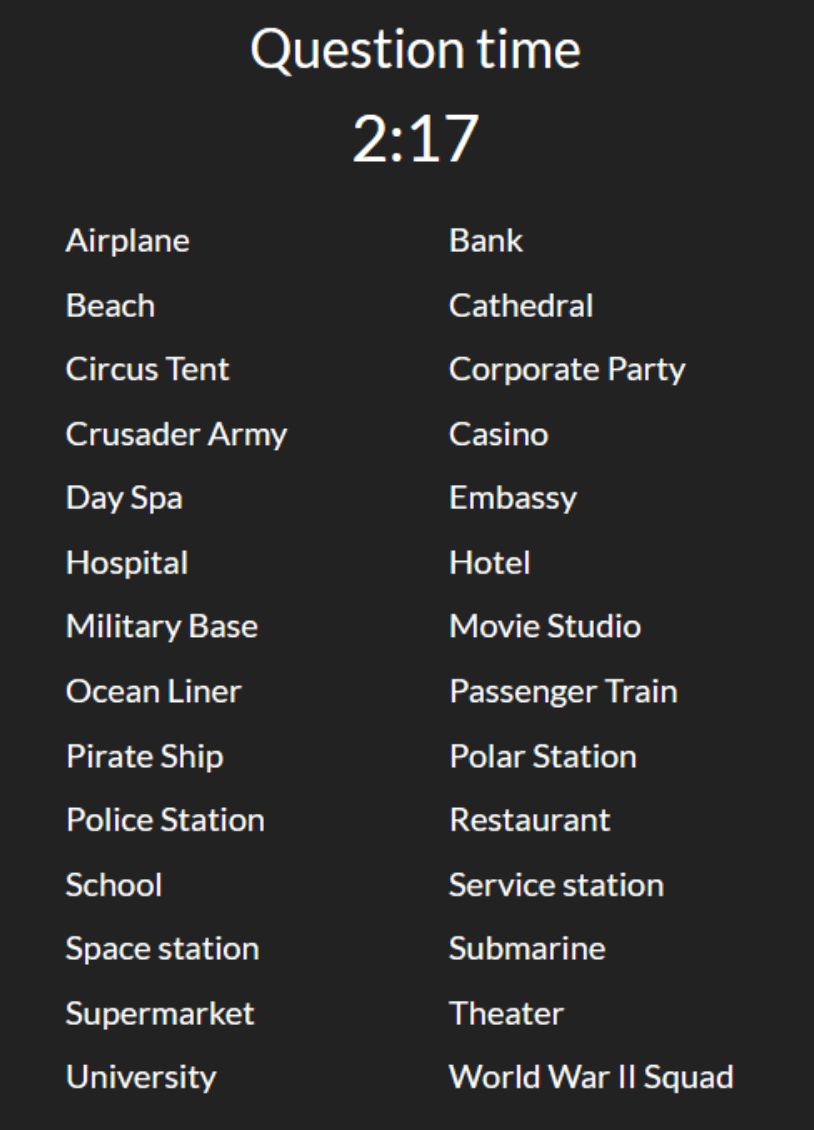For my first critical play, I decided to check out Spyfall with a couple of friends. Spyfall is a 2014 social deduction card game for 3–8 players designed by Alexandr Ushan and published by Hobby World. Even though it’s a card game, it can be played on a variety of platforms. For example, we played the version from netgames.io that was given to us in the assignment. From its casual nature, I imagine that Spyfall’s target audience is quite broad. An online source claims that the website is mostly visited by groups of 18-24 year olds (Link), but I could definitely see both younger and older audiences enjoying this game within social scenarios.

The mechanics of the game were very interesting and intuitive to pick up. After assigning roles (where everyone is given a location, and a spy is given nothing), players have three minutes to ask questions to each other before having to vote for someone. Since there were only three people, the vote only ended when two players reached a consensus. Furthermore, I enjoyed how the player dynamics both had a co-op nature to them, while also involving PvP aspects. Perhaps the tension between these two creates even more fun within discovering who was the spy while not allowing them to find out the location! I also loved how there was a list of the locations during question time. This list can be greatly helpful for both players to deceive the spy, but also for the spy to eliminate and get closer to the true answer. It was a great mechanic that resulted in a fun experience.
In these aspects Spyfall was very similar to the drawing game we played in class, and even had many dynamics that were also present in Mafia. I personally enjoyed it more compared to the drawing game, because the dialogue difference created more opportunities for diverse strategies to emerge. Also, different from Mafia, it felt as though the game was designed in a way that encouraged more participation from everyone. In Mafia, if you are a villager, you don’t have much of a basis to defend yourself from accusations. Here, everyone has a bit more power, and therefore more agency in their decisions / defending their case! The game definitely took advantage of its social aspects, and I feel it had a strong sense of fellowship throughout.
This sense of agency, and knowing the answer made the game very fun. Unfortunately, I only had two other people to play with. And, it was very apparent how having at least 4-5 people really make both being a spy easier, and the voting/questions segment make more sense. Some failures included the fact that “question time” was just too long: there didn’t seem to be enough structure to how the “question time” should play out, which generated a lot of confusion between all of the members involved. That’s probably the main thing that I would change. Of course, adding some house rules, such as “each player has to ask one question” did help, but I would’ve loved for there to be slightly more structure to the game to help with the flow for new players and make the experience a bit more consistent.


